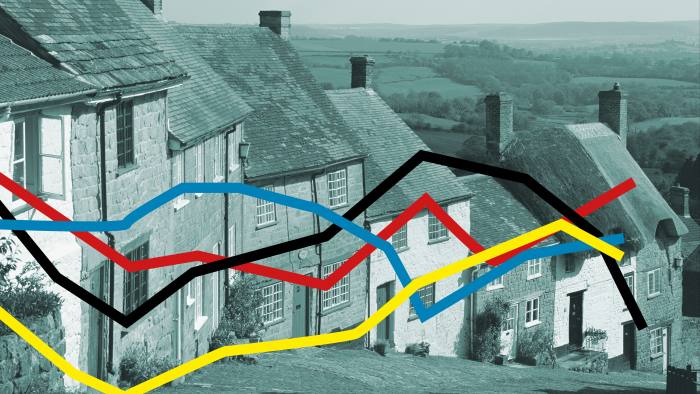By contrast, demand for first-time buyer and second-stepper homes remained strong and asking prices for these mass-market properties reached new heights
.
The average listing price for first-time buyer homes rose by 0.6% compared to last month and by 3.7% year on year to £208,714 in August.
For second-stepper homes prices rose by 0.3% month on month and by 6.6% year on year to £309,643.
But at the upper end of the market, prices for top-of-the-ladder homes with four bedrooms or more slipped by 0.8% or £4,699 to £616,421, although this was still 9.4% higher than last August.
The overall result is that the national average asking price was £1,071 lower than July, which is the first month-on-month fall recorded by Rightmove this year.
Buyer demand remains strong and Rightmove predicts that there will be an autumn bounce in both seller activity and prices.
In the first week of August, individual buyer enquiries to agents are up by 56% on the same period in the pre-Covid year of 2019, and down by just 17% on the frenzied post-lockdown 2020 numbers.
This snapshot also shows that the number of sales agreed is up by 9% on the same period in 2019.
Available stocks for sale remain at record lows with properties selling quickly.
The average time for a newly-listed property to be marked sold subject to contract is the quickest ever at 36 days, which is a whole month faster than in February 2020, which was the last month before the first lock-down.
Fierce competition means that many sellers are choosing to have a buyer lined up before entering the race to secure their own purchase.
Having a sale agreed before they seek to buy puts them at the front of the queue to buy suitable properties as soon as they come to market.
Rightmove director of property data Tim Bannister says: “New sellers dropping their asking prices can ring economy alarm bells, especially when it’s the first time so far this year, so it’s important to dig underneath the headline figures.
“Firstly, we are in the holiday season which means that sellers have traditionally tempted distracted buyers with lower prices, though that might well be less applicable this year with many buyers having to stay a lot closer to home.
“Indeed, our analysis shows that average prices have only fallen in the upper-end sector, which is usually more affected by seasonal factors such as the summer holidays and has also seen the greatest withdrawal of stamp duty incentives.
“The mass-market of properties that cater for first-time buyers and second-steppers is still seeing high demand and upwards price pressure leading to new record high average prices in those sectors.
“In England there remains a smaller stamp duty saving of up to £2,500, though the window to take advantage of this saving by buying now and completing by the end of September is pretty much closed.”
Bannister adds: “Sell before you buy is a successful tactic in fast moving markets, especially the current one where any new listings popular in both specification and location are selling in days rather than weeks.
“Your own buyer will have to show a degree of patience while you wait for the right property to come to market, though the pedestrian speed of the normal legal process often creates the opportunity to play catch-up later if it takes a few weeks to find the right property.
“Some sellers are even completing their sale and going into intermediate rented accommodation and then buying, though this takes extra resolve and time.”
Bannister expects that more property will come to market when home owners have more clarity from their employers about how often they will be required to work from the office.
Until these questions are answered it will be difficult for employees to determine their long-term housing needs.
North London estate agent and former Royal Institution of Chartered Surveyors residential chairman Jeremy Leaf adds: “This is one of the more interesting recent surveys as at first glance it shows asking prices are falling for the first time this year after recording record rises.
“A reversal was hardly unexpected after the government started to taper the stamp duty holiday at the end of June.
“However, when you drill down more deeply into the figures, you see more of what we are finding at the coalface.
“There has been an improvement in demand for smaller houses and flats as buyers will still be able to take advantage of the stamp duty concession but at a reduced level.
“Prices continue to be supported by a shortage of new homes and demand for greater flexibility as many come to terms with new hybrid work patterns.”

